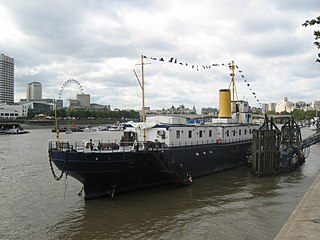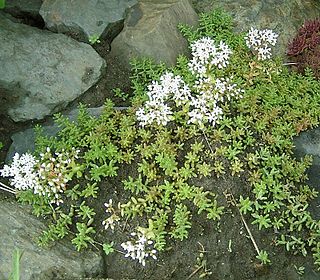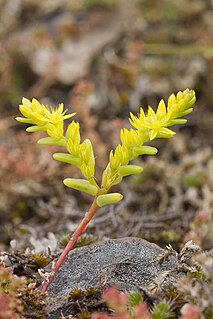Related Research Articles
Hyderabad is the capital and largest city of the Indian state of Telangana.

The Flower-class corvette was a British class of 294 corvettes used during World War II, specifically with the Allied navies as anti-submarine convoy escorts during the Battle of the Atlantic. Royal Navy ships of this class were named after flowers, hence the name of the class.
Several Canadian naval units have been named HMCS Ville de Quebec.

HMS President (1918) is a retired Flower-class Q-ship that was launched in 1918. She was renamed HMS President in 1922 and moored permanently on the Thames as a Royal Navy Reserve drill ship. In 1982 she was sold to private owners and, having changed hands twice, served as a venue for conferences and functions as well as the offices for a number of media companies. She has been moved to Chatham on the Medway in Kent since 2016, but is due to return to the capital. She had the suffix "(1918)" added to her name in order to distinguish her from HMS President, the Royal Naval Reserve base in St Katharine Docks. She is one of the last three surviving Royal Navy warships of the First World War. She is also the sole representative of the first type of purpose built anti-submarine vessels, and is the ancestor of World War II convoy escort sloops, which evolved into modern anti-submarine frigates.

Pennywort is a common name given to several different plants around the world. In general they have round leaves and a low-growing habit. Pennywort may refer to:

Sedum acre, commonly known as the goldmoss stonecrop, mossy stonecrop, goldmoss sedum, biting stonecrop and wallpepper, is a perennial flowering plant in the family Crassulaceae. It is native to Europe, but also naturalised in North America, Japan and New Zealand.

The Flower class comprised five sub-classes of sloops built under the Emergency War Programme for the Royal Navy during World War I, all of which were named after various flowers. They were popularly known as the "herbaceous borders", in humorous reference to a well-known adage about the Royal Navy, as well as to a type of garden border popular in the United Kingdom.
HMS La Malouine was a Flower-class corvette of the Royal Navy, serving during the Second World War. Originally ordered by the French Navy under the same name, following the fall of France, the ship was seized by the United Kingdom and commissioned into the Royal Navy in 1940. The corvette remained in service until being broken up in 1947.

Sedum album, the white stonecrop, is a flowering plant of the genus Sedum in the family Crassulaceae. It is found in the northern temperate regions of the world, often growing in crevices or free-draining rocky soil. As a long-day plant it grows vegetatively for most of the year and flowers in summer.
Two vessels of the Royal Navy have been named HMS Begonia after the flower.
Three ships of the Royal Navy have borne the name HMS Arabis, after the flower, the Arabis.

Sedum ternatum is the most widespread native Sedum species in eastern North America, commonly known as woodland stonecrop. It has white flowers, blooming April to May. This shade-tolerant species is often found in the forest understory, although it can also grow in sunnier locations when sufficient moisture is present. Its common name of "stonecrop" evokes its ability to thrive atop boulders, where its succulent leaves help it to retain moisture in shallow soil. It adapts well to garden use.

Hylotelephium telephioides is a flowering plant in the stonecrop family Crassulaceae. Its common names include Allegheny stonecrop and live-forever. Its native range in the USA extends from Georgia to Illinois and New York, and it has introduced populations in Ontario. In the wild, it is found on rock outcrops, especially at moderate to high elevations.

Sedella is a small genus of annual flowering plants in the family Crassulaceae. There are approximately 7 species, all native to California, United States, one with a distribution extending into Oregon. These are petite succulent plants growing a few centimeters tall and bearing tiny yellowish or brownish flowers. Mock stonecrop is a common name for these plants.
S. debile may refer to:

Sedum spathulifolium is a species of flowering plant in the family Crassulaceae known by the common names broadleaf stonecrop, yellow stonecrop, and spoon-leaved stonecrop. An evergreen perennial, it is native to western North America from British Columbia to southern California, where it can be found often in shade in many types of rocky habitat in coastal and inland hills and mountains.
There have been at least two ships of the Royal Navy named HMS Privet:
Two ships of the Royal Navy have been named HMS Hyderabad :

HMS Stonecrop was a Flower-class corvette of the Royal Navy. She served during the Second World War. She was named after the stonecrop flower (Sedum).

Stonecrop Gardens is a public garden in Cold Spring, New York, U.S. Formerly the home of Anne and Frank Cabot, the founder of The Garden Conservancy, the ground became a public garden in 1992, directed by Caroline Burgess. A variety of gardens include woodland and water gardens, a bamboo grove, stone beds with alpine flowers, systematic flower beds and an enclosed English flower garden.
References
- ↑ Q ship Glenfoyle, uboat.net